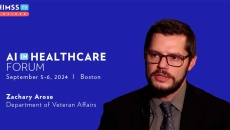Department of Veterans Affairs
When launching a healthcare AI project, Charles Worthington, CTO and Chief AI Officer at the Department of Veterans Affairs, recommends consulting with technology users to understand the problems they encounter and are trying to solve.
An API increases the identification of veteran patients in non-VA hospitals and with outreach for patient-specific targeted benefit information, says Matthew McCay, MultiCare Health System's veteran advocacy manager and Epic's Brett Barker.
The pair will utilize the data analytics company's services to improve real-time data and predictive analytics capabilities to support VA centers nationwide.
Zachary Arose, healthcare technology management chief at the Dayton VA Medical Center, says the VA has integrated an AI algorithm for early detection of lung nodules. AI is also adding administrative and bureaucratic efficiencies.
Dr. Amanda Purnell, director of data and analytics innovation at the VHA Innovation Ecosystem, discusses the Mission Daybreak Grand Challenge.
According to a study published in JAMA Network Open, providing a video-enabled tablet to veterans living in rural areas decreased emergency department visits and suicide behaviors.
This week's top stories include a GAO report that found the VA did not establish performance measures and goals for migrated data quality, and the introduction of the KardiaMobile Card, which is able to take a single-lead ECG in 30 seconds.
This week's top stories include the VA flagging unreliable IT infrastructure cost estimates for its EHR modernization program, a new Alzheimer's drug that could cost Medicaid more than $2 billion, and Amazon using radar for monitoring sleep.
Leaders from Verizon, VA, Microsoft and Medivis discuss how Project Convergence is bringing augmented reality and AI to the surgical theater, thanks to 5G technology, thereby enhancing care to veterans.
The study was published today in Nature.







